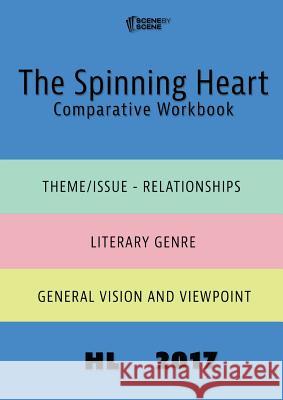The Spinning Heart Comparative Workbook HL17 » książka
The Spinning Heart Comparative Workbook HL17
ISBN-13: 9781910949467 / Angielski / Miękka / 2016 / 110 str.
The Spinning Hear Comparative Workbook 2017 is designed to be used when studying The Spinning Heart, by Donal Ryan, for the Comparative Study component of the Leaving Certificate Higher Level English examination in 2017. This A4 workbook contains 132 questions, covering the modes of Theme/Issue (Relationships), Literary Genre and General Vision and Viewpoint. The workbook is intended to be completed by students when they have studied The Spinning Heart and are beginning to analyse and study the novel in preparation for the Comparative Study. Comparative Study Workbook Series at a glance: Simple, easy to follow layout.
Keeps students' notes in one place - no more missing pages
Colour coding lets students identify the mode they're working in - encouraging student confidence.
'Know your text' questions - students answer text specific questions within each mode.
'Know your mode' questions - students apply their knowledge of the text to clear, direct questions, centred on each mode.
'Compare the Texts' questions - students make comparisons between their Comparative Study texts.
Students' answers become their notes - greater textual engagement than reading notes alone.
Workbook questions focus on Personal Response to develop each student's understanding of the text.
'Know your mode' and 'Compare the Texts' questions are consistent in each workbook - allowing easy comparison of texts for comparative study essay writing. The workbook is divided into three coloured sections, one for each comparative mode. Each coloured section has three parts to it. The first part focuses on the text itself, and asks text specific questions within that comparative mode. This helps students to become familiar with the text and the aspects of the text that are covered by that comparative study mode. The second part of each section focuses on one of the comparative study modes. In this part, more general, mode specific questions are asked. Students then have to take what they know about the text and apply it to the mode. By doing this, they will become very familiar with what each comparative study mode involves, and it will help prepare them for writing essay length comparative study answers. The third part of each section asks students to compare their texts under specific aspects of each mode. Students can identify similarities and differences between their studied texts as they compare and contrast them. Scene by Scene Comparative Workbooks can be used in class, or at home. By completing this workbook, students will have their own comparative study notes organised for independent study. When completing the workbook, students engage with the text, and confidence in their ability to handle the comparative study grows. The colour coding design feature means that Scene by Scene's Comparative Workbooks 2017 complement each other. It is easy to identify each mode and make comparisons and contrasts between texts - simply use matching coloured sections of each of the workbooks to identify similarities and differences.
The Spinning Hear Comparative Workbook 2017 is designed to be used when studying The Spinning Heart, by Donal Ryan, for the Comparative Study component of the Leaving Certificate Higher Level English examination in 2017. This A4 workbook contains 132 questions, covering the modes of Theme/Issue (Relationships), Literary Genre and General Vision and Viewpoint.The workbook is intended to be completed by students when they have studied The Spinning Heart and are beginning to analyse and study the novel in preparation for the Comparative Study.Comparative Study Workbook Series at a glance: Simple, easy to follow layout.
Keeps students’ notes in one place – no more missing pages!
Colour coding lets students identify the mode they’re working in – encouraging student confidence.
‘Know your text’ questions – students answer text specific questions within each mode.
‘Know your mode’ questions – students apply their knowledge of the text to clear, direct questions, centred on each mode.
‘Compare the Texts’ questions – students make comparisons between their Comparative Study texts.
Students’ answers become their notes – greater textual engagement than reading notes alone.
Workbook questions focus on Personal Response to develop each student’s understanding of the text.
‘Know your mode’ and ‘Compare the Texts’ questions are consistent in each workbook – allowing easy comparison of texts for comparative study essay writing.The workbook is divided into three coloured sections, one for each comparative mode. Each coloured section has three parts to it. The first part focuses on the text itself, and asks text specific questions within that comparative mode. This helps students to become familiar with the text and the aspects of the text that are covered by that comparative study mode.The second part of each section focuses on one of the comparative study modes. In this part, more general, mode specific questions are asked. Students then have to take what they know about the text and apply it to the mode. By doing this, they will become very familiar with what each comparative study mode involves, and it will help prepare them for writing essay length comparative study answers.The third part of each section asks students to compare their texts under specific aspects of each mode. Students can identify similarities and differences between their studied texts as they compare and contrast them.Scene by Scene Comparative Workbooks can be used in class, or at home. By completing this workbook, students will have their own comparative study notes organised for independent study. When completing the workbook, students engage with the text, and confidence in their ability to handle the comparative study grows.The colour coding design feature means that Scene by Scene’s Comparative Workbooks 2017 complement each other. It is easy to identify each mode and make comparisons and contrasts between texts – simply use matching coloured sections of each of the workbooks to identify similarities and differences.











